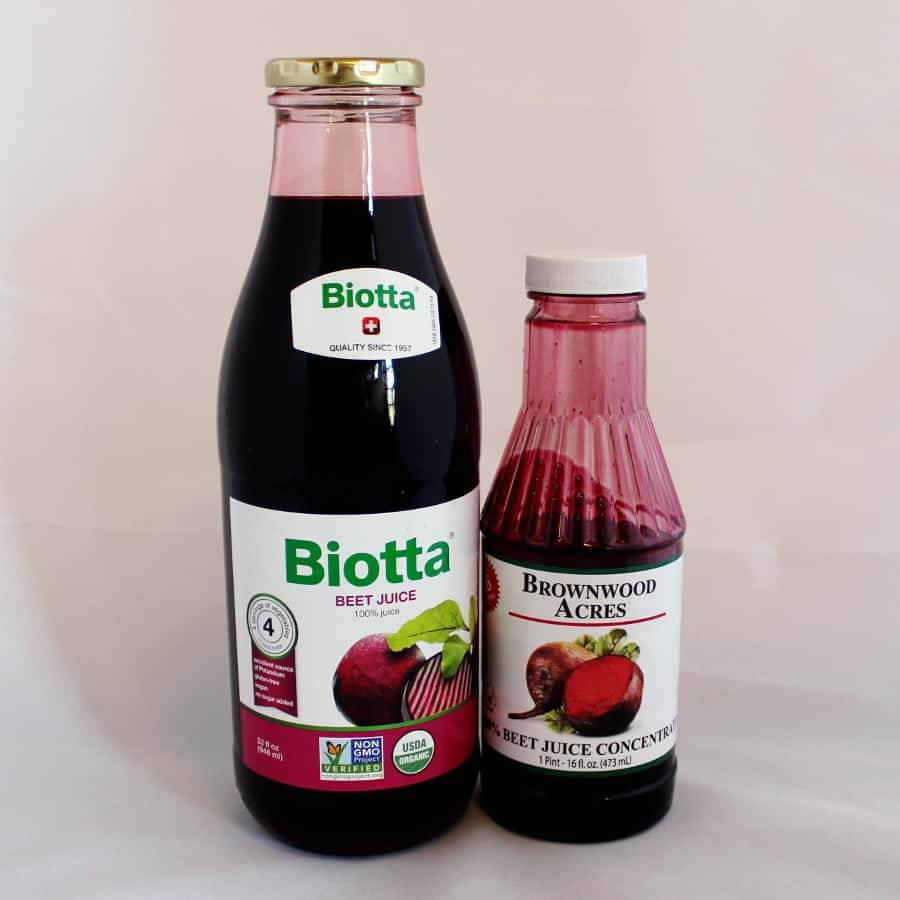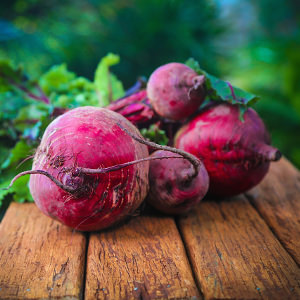
If you have hypertension, your doctor has probably prescribed medicine to lower high blood pressure. You may have gone through quite an extensive period of trial and error to find a drug that works without causing unacceptable side effects. As a result, you might be wondering whether there are foods that could help against hypertension. The good news: the answer is yes. You don’t always have to rely on medications.
Will Eating Beets Lower High Blood Pressure?
Q. I’ve read that drinking beet juice can help control blood pressure. Can you get the same effect from eating beets? (Thus, you’d also get the benefit of some extra fiber.) I like beets better than juice.

CC0 from https://pixabay.com/en/beetroot-food-diet-vegetable-687251/
A. It takes about two good-sized beets to yield a cup of juice. Scientists believe the benefits of drinking beet juice come from the nitrate compounds in the beets (European Journal of Pharmacology, July 15, 2025). The body uses nitrates to make nitric oxide. This powerful compound relaxes blood vessels and helps lower blood pressure. Leafy greens are another good source of nitrate and fiber.
To learn more about other natural approaches for managing hypertension, you may wish to read our eGuide to Blood Pressure Solutions. You will also learn about the pros and cons of popular blood pressure medications.
Not everyone reacts the same to a similar dose of beet juice. In one study, men who drank about five ounces of nitrate-rich beet juice lowered their blood pressure by an average of 7 points (European Journal of Nutrition, Feb. 24, 2025). Some responded more strongly, however, while others had a minimal reaction.
According to the authors,
“The causes of this inter-individual variation deserve further investigation.”
Former Pharmacist Loves Natural Remedies:
Q. I went to pharmacy school and followed that with an internship and a pharmaceutical sales position. In addition, I was married to a pharmacist for decades. Pharmaceutical companies have amassed too much power, in my view.
To fight back, we need scientific tests of herbal cures and vitamins. Big Pharma will never do this because there is no money to be made from herbs.
However, as an 80-year-old who only takes magnesium and a vitamin, I can attest to beet juice and red hibiscus tea for lowering blood pressure and magnesium to strengthen bones and eliminate bedtime muscle cramping and restless leg syndrome. I have been badgered many times to take blood pressure medicine when I was sick and my readings were a bit high. By resisting, I am still healthy with 120 over 76 average readings.
A. You are right that hibiscus tea and beet juice can lower high blood pressure. So can magnesium (Magnesium Research, Aug. 1, 2021). We urge people to work with their healthcare providers to make sure, as you have, that their natural remedies are doing the job.
Trouble with Pills for High Blood Pressure:
Q. I have had unpleasant side effects from every blood pressure pill my doctor has prescribed. I think I tried over six different types. And the worst part? My BP never got consistently lower – and it sometimes spiked to 190/150.
I started mixing a couple of ounces of beet juice with my morning orange juice. Within a week, my BP was much more in the normal range.
I do not care for the taste of beet juice, though. So I switched to beet root capsules (605 mg of beet extract). I take two in the morning and my BP is now in the normal range.
A. Thanks for sharing your success story. There are a number of studies that suggest beet juice can raise nitric oxide levels, which in turn lower blood pressure (Nutrients, July 22, 2019).
There are many ways to manage hypertension. Weight loss, meditation, deep breathing, exercise and diets high in minerals such as magnesium and potassium have all been shown to help. Keep reading for more information. In addition, you can learn more about a variety of non-drug approaches and medicines that can control hypertension in our eGuide to Blood Pressure Solutions.
Difficulty Trying to Lower High Blood Pressure:
Q. I have been dealing with hypertension for years. When I am under stress, my blood pressure goes up to around 150.
My doctor has prescribed lots of different drugs with mixed results. Atenolol caused fatigue and depression. Amlodipine made me dizzy to the point I couldn’t function. Lisinopril caused a horrible cough. Now I am on Diovan with no problems, but I read recently that drugs like this are linked to cancer.
I am ready to try a more natural approach. I heard that beets can lower high blood pressure. How effective are they and what else might help?
Concerns About Blood Pressure Pills:
A. An article in Lancet Oncology (July, 2010) has raised questions about the safety of drugs like Atacand, Diovan and Micardis. The investigators analyzed many scientific studies and concluded that such drugs “are associated with a modestly increased risk of new cancer occurrence.” Drug regulators and clinicians don’t know what to make of this information.
That confusion has intensified since the research was published. More recent studies show that patients taking such drugs are actually less likely to die early of pancreatic cancer (World Journal of Surgery, Sep. 2017). A similar drug, losartan, appears to protect mice from breast cancer (Oncotarget, March 21, 2017). Drugs in this category of angiotensin-receptor blockers (ARBS) also seem to provide some protection against prostate cancer (Woo & Jung, Oncology Letters, May 2017). As a result, doctors don’t want to blame these medicines for causing cancer.
Beet Root Juice for High Blood Pressure:
An article published in the journal Hypertension (Sep. 2010) suggests that about 8.5 ounces of beet juice can significantly lower systolic blood pressure. Since then, there have been numerous other studies of how beet root juice affects blood pressure. One placebo-controlled trial confirmed that this juice can reduce sphygmomanometer readings even in healthy adults (Coles & Clifton, Nutrition Journal, Dec. 11, 2012). Another study showed that older overweight people drinking beet root juice had lower systolic values in their daily measurements (Jajja et al, Nutrition Research, Oct. 2014). A daily cup of beet root juice reduced blood pressure and kept it down for a month in a placebo-controlled trial including volunteers with untreated hypertension (Kapil et al, Hypertension, Feb. 2015).
Will Bottled Beet Juice or Canned Beets Help?
Q. I was going to buy some fresh beet juice from the refrigerated section of our supermarket because I read that it could be helpful for high blood pressure. However, the label warned that it was not pasteurized and could be unsafe for the elderly.
I don’t want to take a chance. Would canned beets or juice be useful for lowering blood pressure?
A. Most of the studies demonstrating that high-nitrate beet juice can help control hypertension provided participants with bottled beet juice rather than fresh. According to the Cleveland Clinic, canned beets are great, too. Look for cans with no added salt if possible, since salt added in canning might raise blood pressure for some people.
People Who Have Had Kidney Stones Should Exercise Caution:
One other precaution: those who have suffered kidney stones will want to be cautious about consuming beets or juice. This root vegetable is rich in oxalates that can raise the risk of this painful complication.
Beet Juice No Substitute for Medical Care to Lower High Blood Pressure:
Of course, beet juice shouldn’t be used for blood pressure control without medical supervision. One study shows that people who keep their blood pressure under control with medication may not get additional help from drinking beet root juice (Kerley et al, Irish Journal of Medical Science, Nov. 2017). Exercise may also lower high blood pressure enough to mask the benefit of beet root juice (Shaltout et al, Nitric Oxide, online May 23, 2017).
Still, drinking beet root juice, exercising, practicing slow breathing and other non-drug alternatives should help your effort to control hypertension. Our eGuide to Blood Pressure Treatment offers more information about beet and pomegranate juice plus other non-drug approaches to controlling hypertension.
Share Your Story With Other Visitors:
Have you tried using beet juice to lower your blood pressure? Have you tried other ways to lower high blood pressure? We’d love to hear your stories. Share them in the comment section below.
Citations
- Minari TP & Pisani LP, "Exploring sodium nitrate supplementation in enhancing nitric oxide bioavailability and reducing oxidative stress: implications for blood pressure and endothelial dysfunction in hypertension." European Journal of Pharmacology, July 15, 2025. DOI: 10.1016/j.ejphar.2025.177702
- Hayes E et al, "Inter-individual differences in the blood pressure lowering effects of dietary nitrate: a randomised double-blind placebo-controlled replicate crossover trial." European Journal of Nutrition, Feb. 24, 2025. DOI: 10.1007/s00394-025-03616-x
- Afitska K et al, "Magnesium citrate supplementation decreased blood pressure and HbA1c in normomagnesemic subjects with metabolic syndrome: a 12-week, placebo-controlled, double-blinded pilot trial." Magnesium Research, Aug. 1, 2021. DOI: 10.1684/mrh.2021.0489
- Stanaway L et al, "Acute supplementation with nitrate-rich beetroot juice causes a greater increase in plasma nitrite and reduction in blood pressure of older compared to younger adults." Nutrients, July 22, 2019. DOI: 10.3390/nu11071683
- Cerullo M et al, "Impact of angiotensin receptor blocker use on overall survival among patients undergoing resection for pancreatic cancer." World Journal of Surgery, Sep. 2017. DOI: 10.1007/s00268-017-4021-8
- Coulson R et al, "The angiotensin receptor blocker, Losartan, inhibits mammary tumor development and progression to invasive carcinoma." Oncotarget, March 21, 2017. DOI: 10.18632/oncotarget.15553
- Woo Y & Jung Y-J, "Angiotensin II receptor blockers induce autophagy in prostate cancer cells." Oncology Letters, May 2017. DOI: 10.3892/ol.2017.5872
- Kapil V et al, "Inorganic nitrate supplementation lowers blood pressure in humans: role for nitrite-derived NO." Hypertension, Sep. 2010. DOI: 10.1161/HYPERTENSIONAHA.110.153536
- Kerley CP et al, "Nitrate-rich beetroot juice selectively lowers ambulatory pressures and LDL cholesterol in uncontrolled but not controlled hypertension: a pilot study." Irish Journal of Medical Science, Nov. 2017. DOI: 10.1007/s11845-016-1551-2
- Shaltout HA et al, "Effects of supervised exercise and dietary nitrate in older adults with controlled hypertension and/or heart failure with preserved ejection fraction." Nitric Oxide, Sep. 30, 2017. DOI: 10.1016/j.niox.2017.05.005

